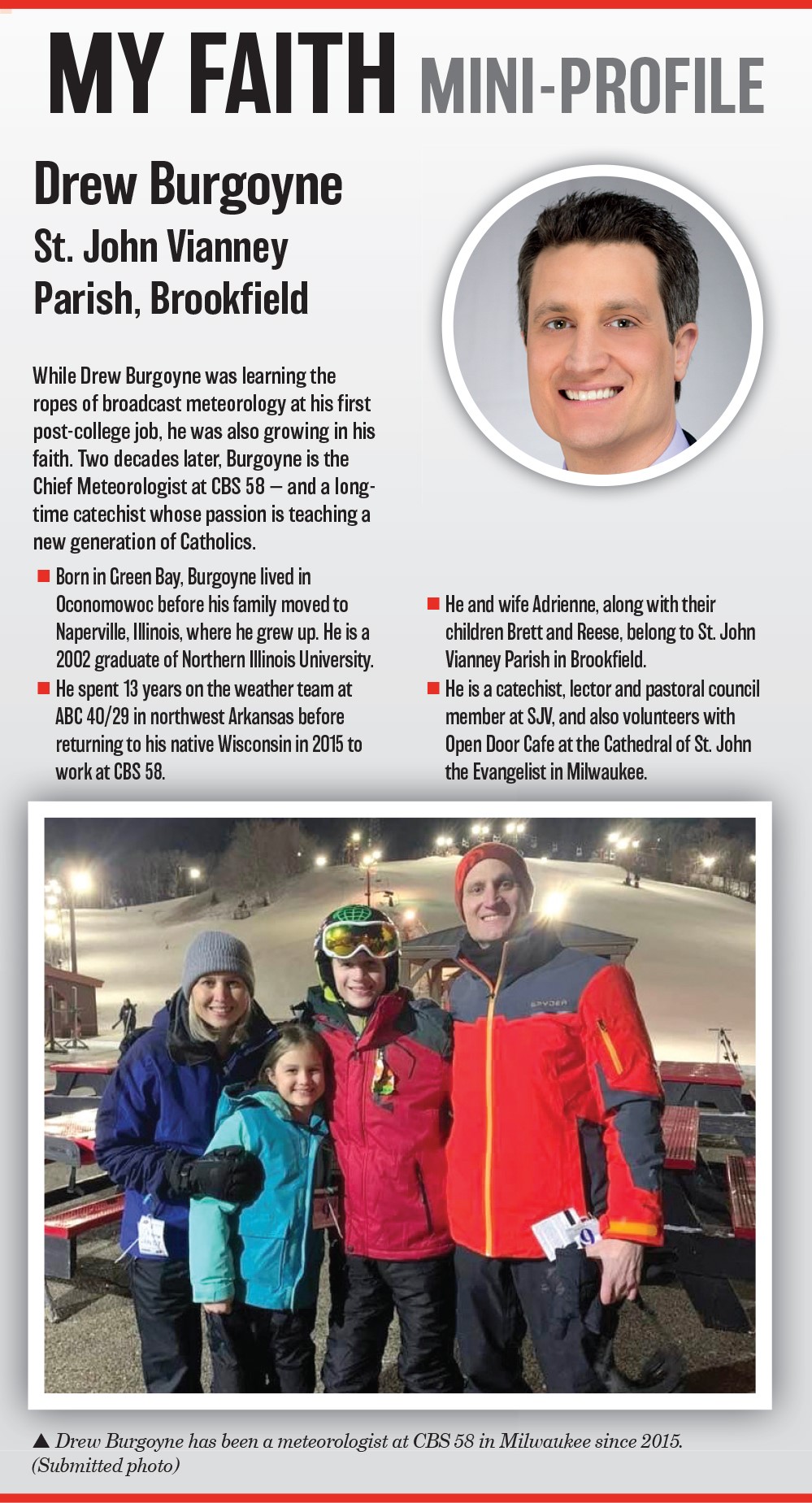Body of Christ
How did you get into meteorology?
I’ve known what I wanted to do since about the fourth grade. I remember watching a PBS special called “Tornado” that featured the Barneveld F5 tornado that occurred back in the 1980s. Since I was from Wisconsin, I felt a connection to that and became very interested. I loved the science and weather part of the job, and it all came together with my interest in television and broadcasting. In high school, I did theater, and I also some public access TV shows out of my basement — kind of like a “Wayne’s World” type deal. My parents weren’t using the space, and they let me and my friends build a studio.
What was your first job in television?
After graduating, I moved down to Fort Smith, Arkansas to take my first job in February 2002. While I was there, I learned a ton about severe weather, but just as much about faith. I’m a cradle Catholic, and what’s interesting about the mid-South is that you’re in Baptist country. I learned a lot of great lessons from the different Protestant denominations of the South, and had great experiences, but it definitely made me a better Catholic. It just ingrained me into our faith, and it really taught me to appreciate the liturgy and what we do every time we go to Mass.
How did it help you grow in your faith, specifically?
The chief that mentored me at the station had a very strong faith. He was Baptist and he would ask me a lot of questions about Catholicism. Most of the time, I didn’t really know the answers. I didn’t know why we do the things we do in the liturgy and where this all came from. He really pushed me, not in a bad way, to learn more about our faith. That’s when I started to grow more. I actually met my wife, Adrienne, in Arkansas when she was converting to Catholicism. She needed a sponsor, and we were friends, and someone said, “Hey, you know, Drew’s Catholic — maybe ask him.” I learned a ton through RCIA.
You’re teaching eighth graders right now, which is an interesting age. Do they have a lot of questions?
They do, once they wake up. They have a lot of questions, and you hope that you can answer them, but the best thing you can say if you can’t is, “I don’t have that answer, but I can get it to you.” Eighth graders today, compared to when I was an eighth grader, are forced to become adults a lot faster. We weren’t dealing with the same stuff — the bullying, the suicide. So if I can relate what we do as Catholics in a way that, hopefully, is applicable to them at this age, I think I’m doing my job. We teach a lot about church history in eighth grade, so you have to be able to relate it. It’s great to help them realize that when we go to Mass, what we’re doing has been going on for thousands of years.
You’re a scientist but you’re also a person of faith. How do those two parts of your life interact with one another?
Faith is something that can’t be quantified, and I think as a scientist, you have to learn that. I’m an operational meteorologist — I look at data and come up with the best guess for a forecast, but I can’t approach my faith as a forecast. When you come out of school — where you’ve studied calculus and physics and taken all of these math-based courses — and then you go on TV, you realize that in the end, if you don’t tell your viewers how to dress properly, you’re not doing your job. I can take all the theory and have it in my head, but in the end, I have to make it applicable to my viewers. I look at faith the same way. There’s only so much I can quantify, and I have to realize that there’s something bigger at play. If I’m prepping for a catechism lesson, I can research as much as I want, but it’s funny how things will come to your head and steer you in different directions. I can’t quantify that — I just go with it.
Other than your current job, what’s the coolest job you’ve ever had?
I’ve got great memories of lifeguarding. Those were always good times. I mowed a lot of lawns, too. And now, even though it is technically meteorology, I consult for the Brewers’ turf manager. So, the guy who takes care of the best lawn in the state, I get to help him prepare. I give them a forecast so they can work their magic. I love that, because I’m that guy who loves to take care of my lawn, so I learn a lot from them as well.

